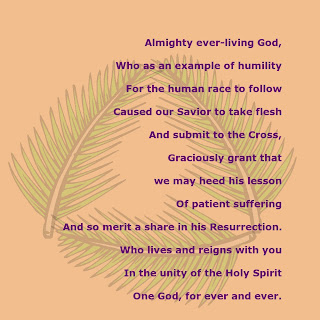 Lectionary: 37 and 38
Lectionary: 37 and 38One of the Twelve, who was called Judas Iscariot, went to the chief priests and said,
"What are you willing to give me
if I hand him over to you?"
They paid him thirty pieces of silver,
and from that time on he looked for an opportunity to hand him over.
Saint Paul's song about the humiliation and exaltation of Jesus in his Letter to the Philippians, which is today's second reading, sums up what we will see and experience in the coming week. His nineteen lines describe the kenosis of the Lord in the first ten lines, and his exaltation in the final nine.
Our collect today suggests one approach to this mystery: we should see "an example of humility for the human race to follow...." We pray that we might "heed his lesson of patient suffering and so merit a share in his resurrection."
Of course, no one can imitate such humility unless they have been swept into the very life of God by the Holy Spirit. A child might imitate a champion basketball player and even attain greatness through aspiration, talent and enormous effort but no amount of trying can approach the kenosis of our God. The very effort is fraught with vanity unless the Spirit has allowed one to utterly forget oneself. If I give away everything I own, and if I hand my body over so that I may boast but do not have love, I gain nothing.
The drama of Holy Week describes Jesus' descending path into abjection. His final cry must be shocking to anyone who expects to emulate the hero: "My God, my God, why have you forsaken me?" Those who would follow the example of the Lord even to his death do not expect to hear a cry of despair.
Clearly, Jesus is not simply setting a pattern for eager disciples to imitate. Saint Paul would recall that, "for a good man someone might have the courage to die" as a soldier might willingly throw himself into a suicidal mission, but that heroic death must pale before the sacrifice of Jesus. In fact, more is asked of the disciple than of the soldier, more than anyone could give without a Gift of the Holy Spirit.
Jesus' great sacrifice is accentuated by the betrayal of Judas. His death would not suffice had the Roman soldiers or the Jewish temple police met stiff resistance from the disciples. Even their cowardly surrender of him in the face of an overwhelming show of force would not do. He had to be betrayed deliberately by one of his own. In the prologue to his gospel Saint John also insists upon that betrayal, "to his own he came and his own received him not."
Animal life is invested with that will to live. Wounded animals desperately crawl away from their tormentors. Cockroaches scurry away from danger. Jesus' disciples followed that impulse as they fled. Each one might have reasoned, "There's no point in my getting killed." Who can blame them?
We can only imagine the dreadful isolation of Jesus as Judas approached, the soldiers closed in and "his own" ran away. Not even the Father, who appeared to Adam and Abraham, who spoke familiarly with Moses, would make an appearance. Stripped of the comfort of companionship, of all compassion, his humanity seemed nothing more than an illusion. Survivors of the Holocaust described that sense of abandonment as they realized rescue was not coming. The entire world had shunned and forgotten them.
Entering Holy Week we enter the Holy of Holies, the most sacred and silent sanctuary where God offers himself to God. Despite our abandonment of him, the Son gathers us into his Sacred Heart and presents us to his Father for our salvation.
No comments:
Post a Comment
I love to write. This blog helps me to meditate on the Word of God, and I hope to make some contribution to our contemplations of God's Mighty Works.
Ordinarily, I write these reflections two or three weeks in advance of their publication. I do not intend to comment on current events.
I understand many people prefer gender-neutral references to "God." I don't disagree with them but find that language impersonal, unappealing and tasteless. When I refer to "God" I think of the One whom Jesus called "Abba" and "Father", and I would not attempt to improve on Jesus' language.
You're welcome to add a thought or raise a question.